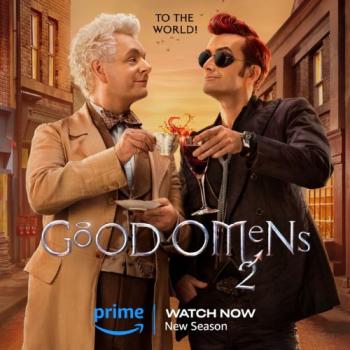John Fea, who teaches history at Messiah College, reports from the Conference on Faith and History, where some of the smartest people studying this stuff struggled to define the term “evangelical.”
This is a perennial problem for historians. Evangelical Christianity seems to be a thing that exists and that matters in history, but where that thing begins and ends has always been hard to say. British historian David Bebbington was at this conference — he of the famous “quadrilateral” that offers a DSM-like description of evangelicalism listing several religious temperaments or tendencies. Mark Noll, Fea reports, offered a qualified commendation of Bebbington’s definition, saying, “There is no such thing as evangelicalism and David Bebbington has provided the best possible definition for it.”
Bebbington responded that he thinks evangelicalism exists because evangelicals have said it does.
I’d add that Noll himself provides an excellent description of evangelicalism, whether or not it exists, in his detailed critique of it, The Scandal of the Evangelical Mind. That book, I think, may provide an even better list of symptoms of evangelical distinctiveness than Bebbington’s quadrilateral.
With Bebbington and Noll, plus folks like Molly Worthen, all in one room, commending one another while discussing the inadequacies of their own best efforts to define this thing, the conference seems to have been something like the Marshall McLuhan scene in Annie Hall: I happen to have myself here, and I know nothing of my work.
One thing I think is missing in all of their insightful and constructive attempts to define this nebulous thing of evangelical Christianity is the cultural component. The historians seem to regard the cultural and sub-cultural distinctives of evangelicalism as traits that arise from its religious distinctives. I think that’s backwards. I think the subculture shapes the religion more than the other way ’round.
That’s part of why I make a point of referring not just to evangelicalism, but to white evangelicalism. It’s whiteness defines it and determines its shape.
A few years back, I half-jokingly suggested that a Foxworthian definition of white evangelicalism might be more accurate than any effort to define it according to doctrinal or religious traits. Foxworthian as in Jeff Foxworthy, he of the endless “You might be a redneck …” jokes. So I offered a bunch of my own “You might be an evangelical …” jokes:
• If you feel guilty for not keeping up with your quiet time, then you might be an evangelical.
• If you have strong opinions about when, precisely, Amy Grant “sold out,” then you might be an evangelical.
• If you’ve never been skiing without rededicating your life to Christ at a bonfire afterwards, then …
• If you’ve lost track of the number of “re-s” you need to add before “re-re-rededicate your life to Christ,” then …
• If you’ve ever seriously discussed whether using tabs constitutes cheating at Sword Drills, then …
• If your gaydar is so bad that you think your choir director just needs to meet the right godly woman, then …
• If you can’t look at Kente cloth without thinking what those colors stand for in The Wordless Book, then …
• If you’ve ever informed someone you’ve just met that they deserve to suffer in Hell for eternity, and you said this without a trace of anger, then …
• If the last rock concert you went to included an altar call, then …
• If you own any clothing or accessories that you regard as “a witnessing tool,” then …
• If you think the phrase “a witnessing tool” refers to something that’s good to have rather than someone it’s bad to be, then …
Happily, John Fea has also been giving semi-serious consideration to such Foxworthian cultural definitions too. And he’s come up with a 13-question subcultural quiz, based partly on Randall Balmer’s Mine Eyes Have Seen the Glory, inviting us to play along.
Invitation accepted. Here are Dr. Fea’s 13 questions, and my answers:
1. Do you attend a church of over 2000 people?
These days, I usually attend a church of more than 2 million members, which is part of a communion of more than 80 million. But the actual congregation is only about 100 people. And the biggest congregation I’ve ever belonged to was only about 400. So this would be a “No.”
2. Have you studied at, or do you work at, a college that identified itself as a “Christian college?”
While the presence of folks like Tony Campolo and Peter Enns may cause some to reject its claim, my alma mater does, in fact, identify itself as a Christian college.
 3. Have you seen the rapture movie A Thief in the Night? (I could have probably asked if they read the Left Behind series of novels by Jerry Jenkins and Tim LaHaye).
3. Have you seen the rapture movie A Thief in the Night? (I could have probably asked if they read the Left Behind series of novels by Jerry Jenkins and Tim LaHaye).
Yes. (And let’s just say yes.)
4. Have you been to any of the following Christian Bible conferences: Word of Life, Camp of the Woods, Harvey Cedars, America’s Keswick, Sandy Cove, or Rumney Bible Conference? [Fea’s quiz was written for a northeast group]
I’ve heard Uncle Jack preach more times than I can count. Yes.
5. Did you vote for George Bush in 2000 or 2004?
No, and hell no. Kudos to Dr. Fea for A) including this question; and B) not making this the only question.
6. Have you been on a short-term mission trip?
Just one? High-school youth group lasts for four years.
7. Have you attended a Billy Graham or other evangelistic crusade?
Others, yes, many others — but I’ve only ever seen Billy on TV.
8. Have you read Josh McDowell’s Evidence That Demands a Verdict?
And also the sequel, More Evidence That Demands a Verdict. Sadly, such things can never be un-read.
9. Have you read something by C.S. Lewis?
I never got all the way through his collected letters, but except for that, I’ve read just about everything by C.S. Lewis.
10. Do you listen to Christian radio?
Not anymore, except for when I’m driving to DC or to Pittsburgh and I hit those otherwise dead spots south of Aberdeen or west of Harrisburg. But during the years I spent writing Christian music reviews I listened to a lot of Christian radio. Plus, I’ve written for Christian radio, been interviewed on Christian radio, and I was a DJ for the Christian station back at my Christian college. So I’m claiming half-credit on this one.
11. Do you have a Thomas Kinkade painting in your house?
I have a Howard Finster painting, does that count? That does not count. If I lived in a charming little cottage alongside a quaint cobblestone path, the warm glow of soft, fuzzy light you’d see pouring from my cottage windows would be from a fire in which I was burning Thomas Kinkade paintings.
12. Have you read Rick Warren’s The Purpose Driven Life?
I have not. Just couldn’t get past the lack of a hyphen in that title.
13. Do you read or subscribe to Christianity Today?
Yep.
So, then, my final score is 8.5 out of 13 — only 35 percent backslidden!
I’ll note that this makes me just slightly less evangelical than Dr. Fea himself, who scored a 9 on his own quiz. (I won’t speculate too much, but I’m guessing he doesn’t own any Kinkade prints either.)
That was fun. All that’s missing, I think, is one of those little charts classifying the meaning of one’s score. Perhaps something like this:
0-5: If you were to die tonight, do you know where you’d spend eternity? Because we do, and it ain’t pretty.
6-7: We’ve missed you at church the past few Sundays. We’re praying for you.
8-9: You’re an evangelical, sort of … but we’re watching you.
10-12: Hiddley-ho, neighbor, and Praise the Lord!
13: It’s an honor to meet you, Rev. Graham. And on behalf of all of us, we’d just like to thank you for your long, faithful …















